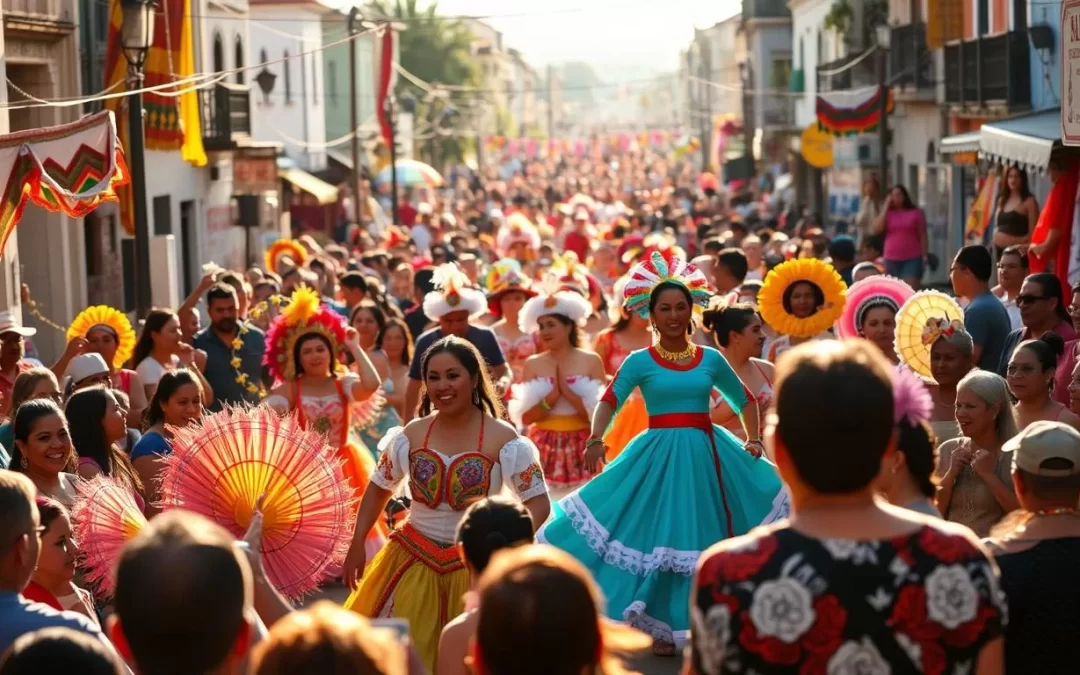When planning your trip, you might wonder whether to coincide your visit with the numerous holidays and festivals that take place throughout the year in this Central American country. Salvadorans are known for their festive spirit, celebrating a wide range of events that offer a genuine glimpse into their traditions, history, and cultural identity.
From religious celebrations to food festivals and unique cultural events, there’s no shortage of exciting things to experience during your visit. By attending these festivals, you’ll have the opportunity to connect with the locals and witness the resilient and joyful spirit of the people in this country. Whether you’re looking to immerse yourself in the local culture or simply enjoy the festivities, this guide will help you plan your trip during the most significant and exciting events.
Understanding El Salvador’s Festival Culture
El Salvador’s festivals are a window into the country’s soul, revealing a deep connection to its history, faith, and community. As you explore these celebrations, you’ll discover a rich tapestry of traditions that have been woven together over centuries.
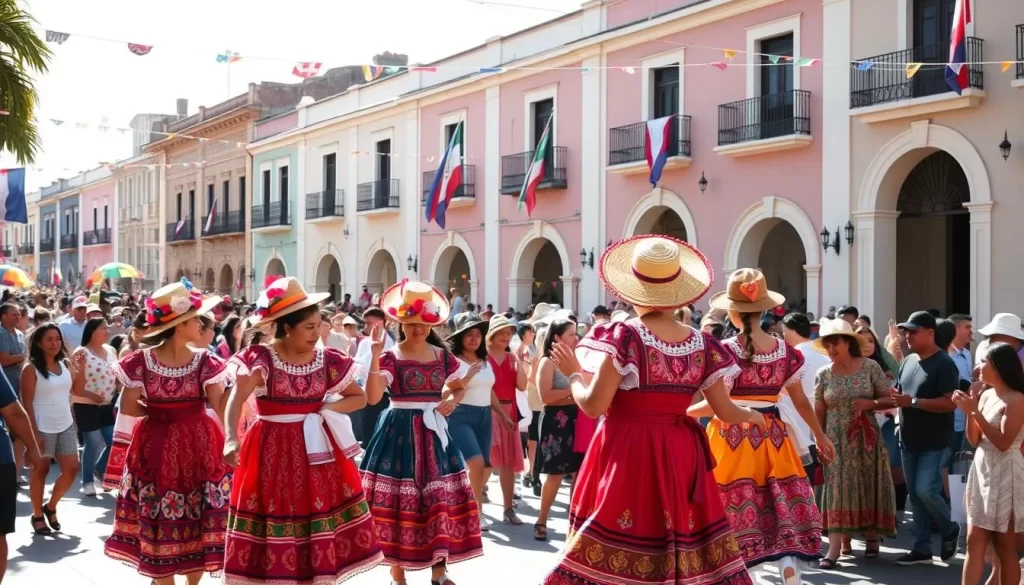
The Importance of Celebrations in Salvadoran Society
Festivals play a vital role in Salvadoran society, bringing communities together and providing a sense of unity and shared identity. Many of these celebrations have their roots in religious traditions, particularly Catholicism, which was introduced by Spanish colonizers. Over time, these festivals have evolved to incorporate indigenous elements and modern cultural expressions, creating a unique blend of old and new.
For instance, during a typical fiesta, you might witness traditional dances, hear local music, and see elaborate processions. These events are not just entertaining; they also serve as a way to preserve cultural heritage and pass it down to younger generations.
| Festival Aspect | Traditional Influence | Modern Expression |
|---|---|---|
| Music and Dance | Indigenous and Spanish roots | Contemporary fusion with global styles |
| Food | Traditional dishes like pupusas | Innovative cuisine incorporating local ingredients |
| Processions | Religious iconography | Elaborate floats and street decorations |
Religious and Cultural Influences on Festivals
The influence of Catholicism is evident in many Salvadoran festivals, with celebrations often centered around patron saints and religious holidays. However, these events also incorporate elements from indigenous cultures, such as the Mayan and Pipil traditions, creating a unique syncretic blend. As you tour the country during a festival, you’ll notice the vibrant street decorations and the lively atmosphere that pervades every week of celebration.
Some festivals have become significant tour attractions, drawing visitors from around the world. These events offer a glimpse into El Salvador’s rich cultural heritage and provide a unique opportunity to experience the country’s traditions firsthand.
Best Time to Experience El Salvador’s Festivals
To fully immerse yourself in El Salvador’s festive spirit, understanding the best time to visit is essential. The country’s festival calendar is rich and varied, reflecting its deep cultural heritage.
Festival Calendar Throughout the Year
El Salvador hosts a multitude of festivals throughout the year, each with its unique charm. The dry season, from November to April, is particularly conducive to outdoor celebrations, offering sunny days ideal for beach and cultural festivals.
- November to April: Dry season, perfect for outdoor festivals.
- May to October: Rainy season, with some festivals still taking place, especially those related to harvests.
Weather Considerations for Festival Planning
The distinct wet and dry seasons significantly impact the festival experience. While the dry season offers comfortable weather, the rainy season brings afternoon showers, which rarely last all day. Coastal festivals might be affected by stronger waves during the wet season.
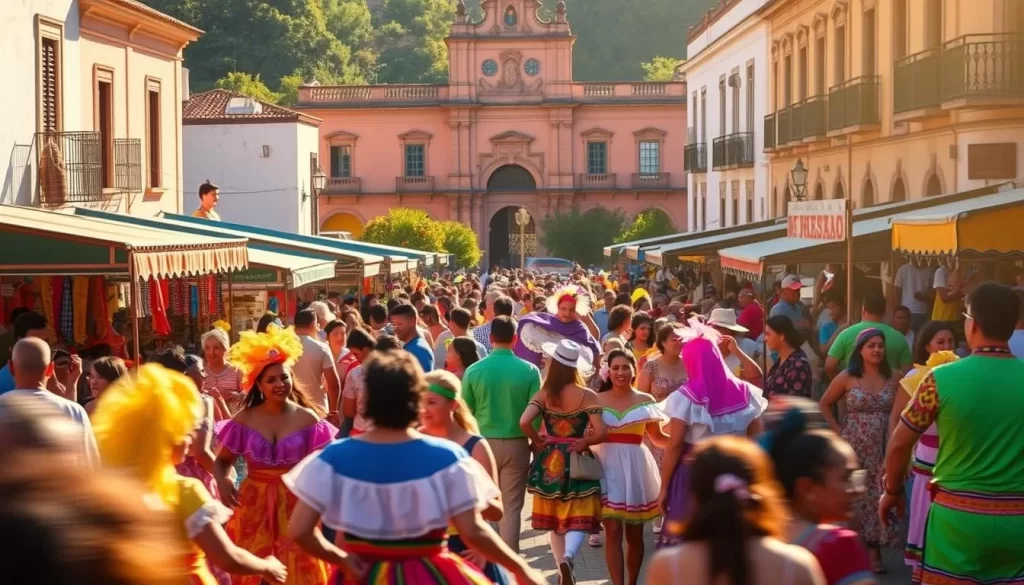
Religious Celebrations and Patron Saint Festivals
As you explore El Salvador, you’ll discover that religious celebrations and patron saint festivals are an integral part of the country’s identity. These events are deeply rooted in the nation’s history and culture, reflecting a blend of indigenous, Spanish, and Catholic influences.
Fiestas Patronales Across Different Towns
Fiestas Patronales, or patron saint festivals, are celebrated in towns across El Salvador, each with its unique traditions and festivities. These events typically honor the town’s patron saint with processions, music, and traditional dances. For instance, the town of San Salvador celebrates its patron saint with great fervor, featuring elaborate processions and cultural events.
The festivities are not just religious observances but also occasions for family reunions and community gatherings. Visitors can experience the rich cultural heritage of El Salvador by participating in these festivals, enjoying local cuisine, and witnessing the vibrant decorations and parades.
Semana Santa: Holy Week Celebrations
Semana Santa, or Holy Week, is one of the most significant religious observances in El Salvador, taking place the week before Easter. The country comes alive with elaborate street processions, particularly on Good Friday, featuring religious imagery and reenactments of the Passion of Christ.
The tradition of creating colorful “alfombras” (carpets) made of dyed sawdust, flowers, and other materials along procession routes is a hallmark of Semana Santa. Coastal towns become particularly lively during this period as many Salvadorans take their annual vacation, enjoying seafood dishes and traditional sweets.
While the religious observances are solemn, the atmosphere at the beaches is festive, with many people enjoying ceviche and cerveza. Travelers visiting during this busy period should book accommodations well in advance and be prepared for crowds at popular destinations.
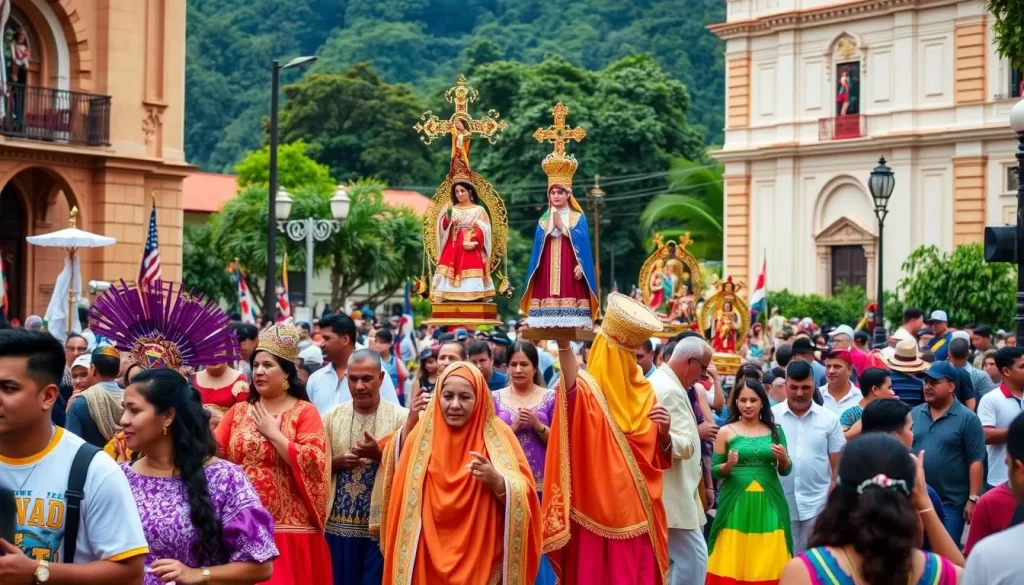
Fiestas Julias in Santa Ana
Every year, the city of Santa Ana comes alive with the Fiestas Julias, a spectacular event that embodies the spirit of Salvadoran culture. This festival is a significant cultural celebration in El Salvador, attracting visitors from all over the world.
History and Significance of Santa Ana’s Biggest Festival
The Fiestas Julias has a rich history, dating back to the early 20th century. It is a celebration in honor of Santa Ana, the patron saint of the city. The festival is a blend of religious and cultural traditions, making it a unique experience for attendees.
What to Expect: Parades, Carnivals, and Events
During the Fiestas Julias, you can expect a variety of exciting events. The grand opening parade is a highlight, featuring floats, traditional dancers, and musical groups. The carnival atmosphere takes over the streets of Santa Ana, with rides, games, and food stalls creating a festive environment. You can also enjoy sporting events, including traditional games and modern competitions, taking place throughout the day.
The festival also includes a religious procession carrying the image of Santa Ana through the city streets, which is a significant part of the celebrations. Nightly concerts and performances feature both traditional Salvadoran music and contemporary artists, making it a great place to experience the local culture.
Las Bolas de Fuego: El Salvador’s Most Unique Festival
Las Bolas de Fuego, or ‘Balls of Fire,’ is a one-of-a-kind festival that showcases El Salvador’s rich cultural heritage in a spectacularly fiery way. This event is not just a thing to witness; it’s an experience that will leave you with lifelong memories. If you’re planning to attend, consider booking a tour that includes transportation, as navigating to Nejapa on your own, especially by bus or car, can be complicated.
The Origin Story of the “Balls of Fire” Festival
The “Balls of Fire” festival has its roots in a local legend. The story goes that on August 31, 1922, a volcanic eruption was preceded by a series of strange occurrences, including balls of fire falling from the sky. To commemorate this event, the people of Nejapa began celebrating with a festival that reenacts the fiery spectacle.
Experiencing the Fiery Spectacle in Nejapa
When you attend Las Bolas de Fuego, you’ll be surrounded by the vibrant culture of El Salvador. The festival involves participants throwing fireballs at each other, creating a truly unique and exhilarating atmosphere. To make the most of your visit, arrive early to secure a good viewing spot behind the safety barriers. It’s also advisable to wear protective clothing, including long sleeves and closed shoes, and to stay hydrated by bringing water.
Safety Tips for Visitors
While Las Bolas de Fuego is a thrilling spectacle, safety should be your top priority. Maintain a safe distance from the action, and follow the instructions of local authorities and safety personnel. It’s also recommended to avoid wearing synthetic materials that could melt if exposed to heat. With paramedics and police on-site, you’re in good hands, but it’s still crucial to remain vigilant.
El Salvador’s National Celebrations
The spirit of celebration is palpable in El Salvador, where national festivities bring people together. These events are a testament to the country’s rich cultural heritage and its people’s love for celebration.
Fiestas Agostinas: Celebrating the Divine Savior
Fiestas Agostinas, held in honor of El Salvador del Mundo (The Divine Savior), is a significant national celebration in El Salvador. This festive event takes place in August and is characterized by religious processions, cultural events, and traditional activities. You can experience the country’s deep-rooted faith and cultural traditions during this celebration. The festivities include traditional music and dancing, showcasing the country’s vibrant cultural scene.
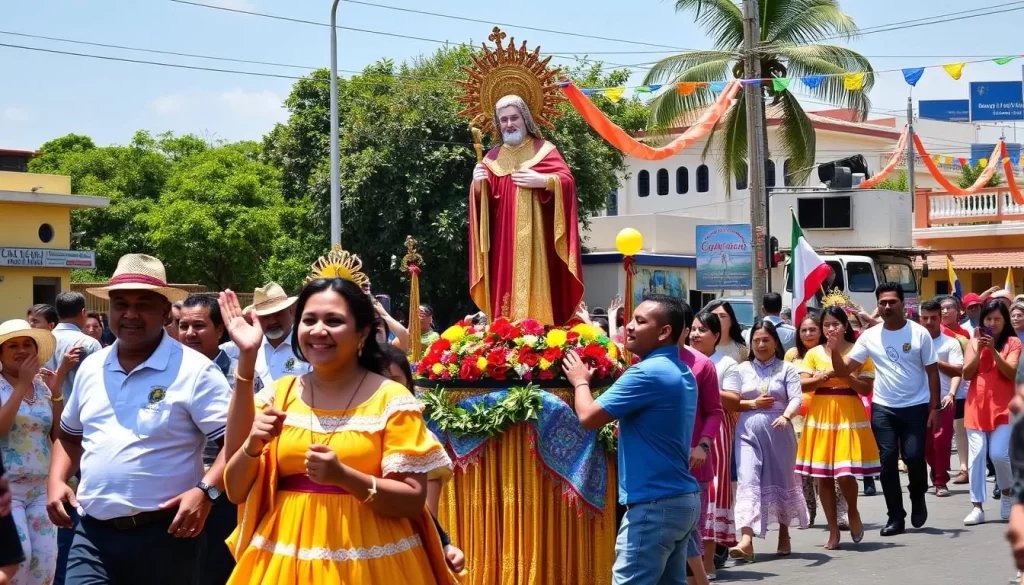
Día de Independencia: Independence Day Celebrations
Día de Independencia, or Independence Day, is a momentous occasion in El Salvador, commemorating its independence from Spain. The celebrations are marked by patriotic events, parades, and cultural activities across the country. You can witness the national pride and fervor as Salvadorans celebrate their independence on August 15th, a day filled with patriotic music and traditional food.
Carnaval de San Miguel: El Salvador’s Biggest Party
Carnaval de San Miguel is El Salvador’s most exuberant celebration, transforming the town into “the party capital of Central America” during the last week of November. Originally a religious celebration for the city’s patron saint, it has evolved into a massive street party that attracts visitors from across Central America. You can expect colorful parades featuring elaborate floats, costumed dancers, and musical groups winding through San Miguel’s streets, creating a lively night atmosphere. The carnival also features nightly concerts with national and international artists performing a range of music, from traditional Salvadoran tunes to contemporary Latin pop and reggaeton, making it a party like no other. The street food scene is also a highlight, with vendors selling traditional Salvadoran dishes and carnival treats. To ensure a safe experience, significant security measures are put in place during the event. It’s advisable to book your accommodations in San Miguel well in advance, as they tend to fill up quickly during carnival week.
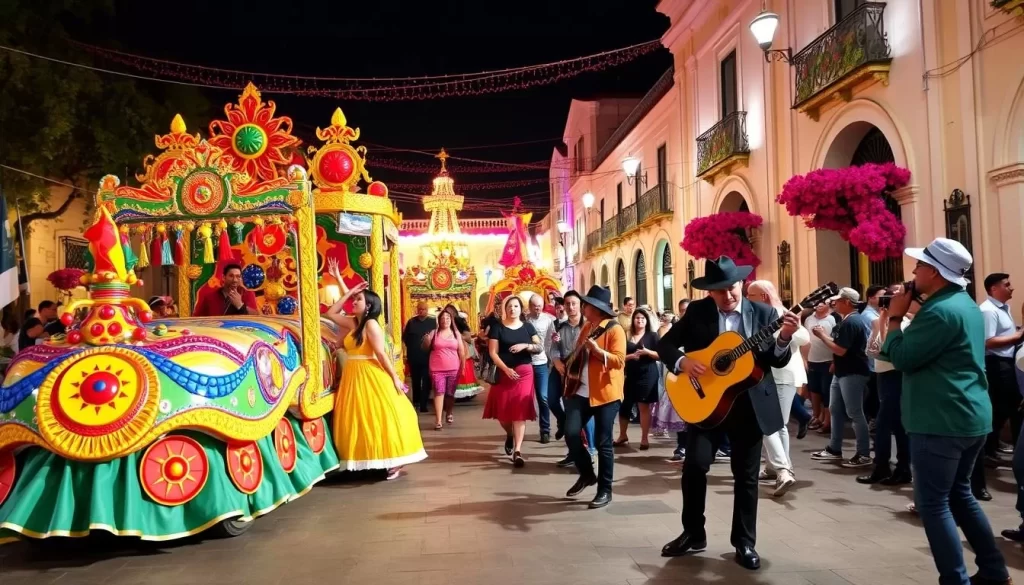
Food Festivals and Culinary Celebrations
El Salvador’s culinary scene is a vibrant reflection of its culture, with numerous food festivals celebrating the country’s rich gastronomy. You can experience the heart of Salvadoran cuisine at these events, which showcase traditional dishes and innovative flavors.
Juayua Weekend Food Festival
The Juayua Weekend Food Festival is a culinary highlight, attracting visitors with its array of local dishes and vibrant atmosphere. You can sample a variety of traditional foods, including pupusas, which are a staple of Salvadoran cuisine.
During the festival, you can enjoy not only the local flavors but also the cultural performances and handicrafts that add to the festive ambiance.
Pupusa Festivals and Local Food Celebrations
Pupusas, thick corn tortillas stuffed with various fillings, are El Salvador’s national dish and the star of numerous food festivals. You can celebrate National Pupusa Day on the second Sunday of November, when communities across El Salvador honor this beloved dish.
The town of Olocuilta is known for its unique rice flour pupusas and hosts regular pupusa festivals, showcasing local variations and traditional fillings like cheese, beans, and pork, as well as modern innovations. You can enjoy these pupusas with curtido, a fermented cabbage slaw, and tomato sauce, which are traditional accompaniments.
These festivals not only celebrate food but also preserve culinary traditions and support local economies through tourism, making them a significant part of El Salvador’s cultural heritage.
Lesser-Known but Worthwhile Festival Experiences
Beyond the well-known festivals, El Salvador offers a plethora of lesser-known cultural experiences worth exploring. These events provide a unique glimpse into the country’s rich cultural heritage and are definitely worth visiting.
Coffee Harvest Celebrations
El Salvador’s coffee harvest season is celebrated with great fervor, particularly in regions known for their coffee plantations. You can experience the coffee harvest festivities, which often include tours of coffee farms, tastings of freshly harvested coffee, and traditional celebrations. The coffee harvest typically takes place between November and February, with the peak season being December and January. Visitors can enjoy the scenic beauty of the coffee plantations and learn about the coffee-making process from farm to cup.
| Region | Time of Celebration | Main Activities |
|---|---|---|
| Coffee plantations in Santa Ana | December to February | Coffee farm tours, coffee tastings |
| Coffee regions in Apaneca | November to January | Harvest festivals, traditional food |
Local Music and Arts Festivals
El Salvador boasts a vibrant music and arts scene, with numerous festivals celebrating local talent. You can enjoy the Festival Internacional de Coros (International Choir Festival) in San Salvador, which brings together choirs from around the world. Additionally, emerging independent music festivals featuring rock, electronic, and alternative music are gaining popularity in urban areas. Traditional folk music festivals preserve indigenous and mestizo musical traditions, featuring instruments like the marimba and indigenous flutes. Street art festivals and urban art initiatives are also transforming cities like San Salvador with colorful murals and public installations.
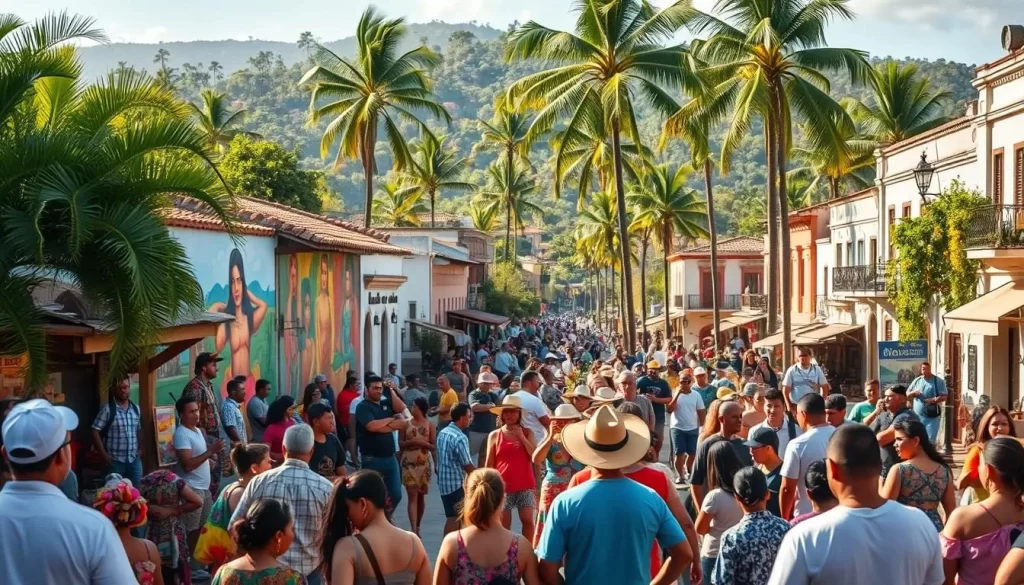
These cultural festivals often take place in historic settings, allowing you to experience both contemporary arts and traditional architecture simultaneously. Literary festivals and book fairs celebrating Salvadoran authors and poets are held in cultural centers and universities, adding to the rich cultural landscape.
Practical Tips for Festival-Goers in El Salvador
As you prepare for your journey to El Salvador’s vibrant festivals, here are some practical tips to enhance your experience. With a little planning, you can ensure that your trip is both enjoyable and stress-free.
Transportation and Accommodation
When planning your trip to El Salvador’s festivals, it’s crucial to arrange your transportation and accommodation in advance. Many locals travel to festival locations by bus, but you may prefer to book a shuttle or taxi service for convenience. Booking your hotel early is also advisable, as rooms fill up quickly during festival seasons.
Consider the location of your accommodation relative to the festival venues to minimize travel time. Some festivals are held in remote areas, so planning your logistics is key.
Cultural Etiquette and Safety
Understanding and respecting local customs is vital when attending festivals in El Salvador. Be mindful of your surroundings, especially at night, and follow local guidance on safety. It’s also a good idea to stay hydrated and be aware of the local environment to avoid any health issues.
By being culturally sensitive and aware of your surroundings, you can have a more enjoyable and safe experience at the festivals.
What to Pack
Packing the right things for your festival adventure is essential. Bring layers for varying temperatures between day and night, especially in highland areas where it can get chilly. Don’t forget sun protection, comfortable shoes, and a water bottle to stay hydrated. A lightweight rain poncho is also a good idea during the wet season.
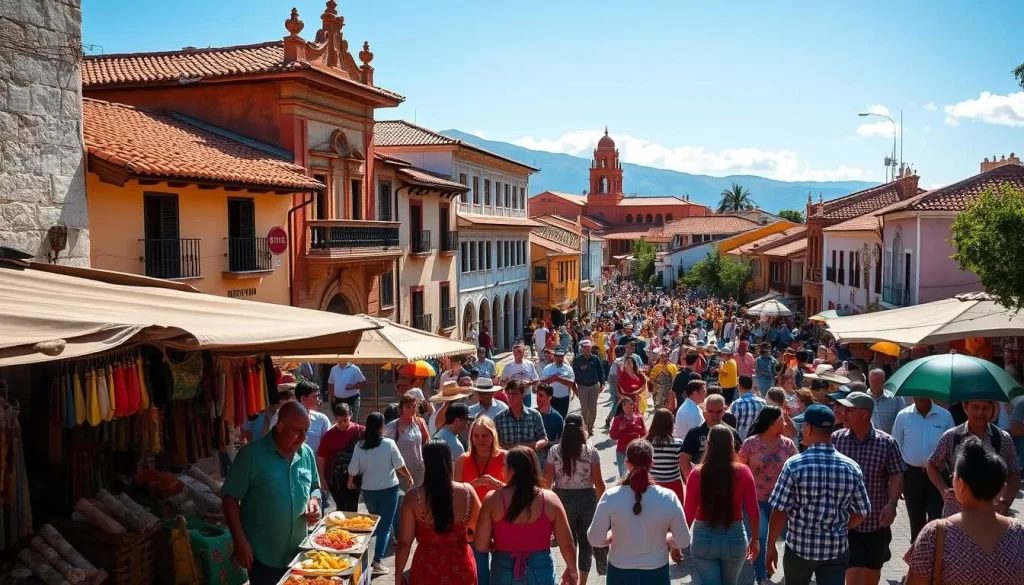
Conclusion: Embracing the Festive Spirit of El Salvador
From religious processions to fiery spectacles and culinary celebrations, El Salvador’s festivals showcase the country’s diverse culture. Participating in local festivals provides a deeper understanding of Salvadoran traditions and connects travelers with local communities. These events offer a window into the soul of El Salvador, revealing the country’s resilience, creativity, and joy. When planning your trip, consider timing it around one of these festivals to experience El Salvador at its most vibrant. Not only will you witness the authentic spirit of the nation, but you’ll also be supporting local economies and helping preserve cultural traditions for future generations. With many festivals remaining untouched by mass tourism, visitors can still enjoy an authentic experience. The warm welcome extended to visitors during these times exemplifies the hospitality that makes El Salvador a special destination.
The above is subject to change.
Check back often to TRAVEL.COM for the latest travel tips and deals.
Here are some Tours & Sightseeing suggestions that might pique your interests!
